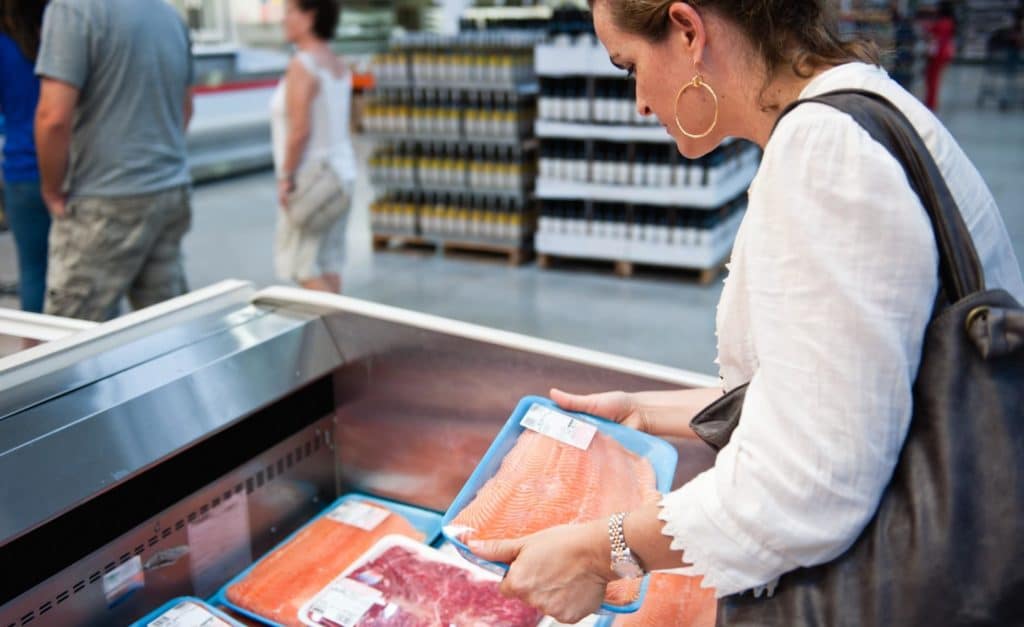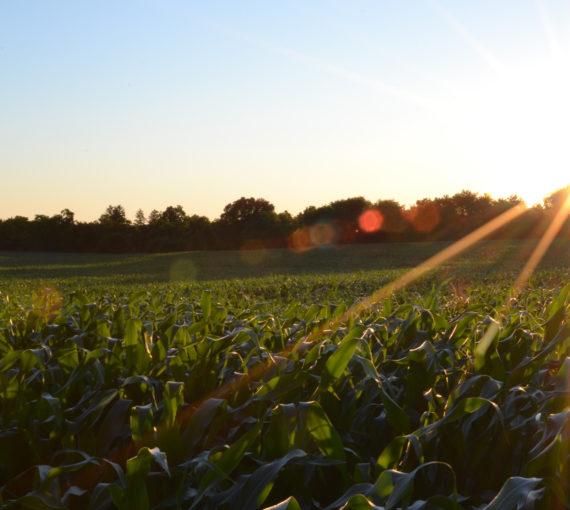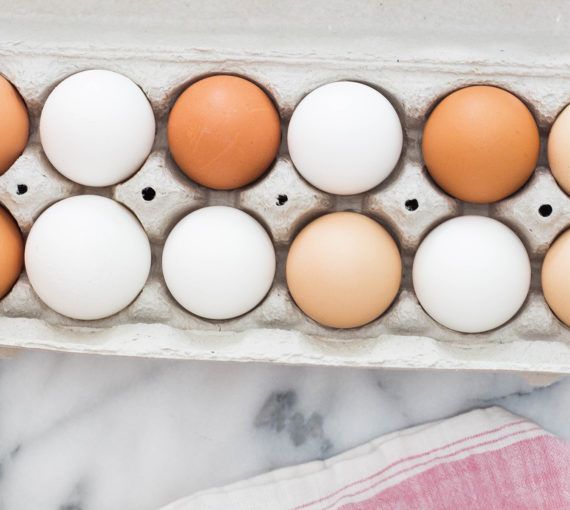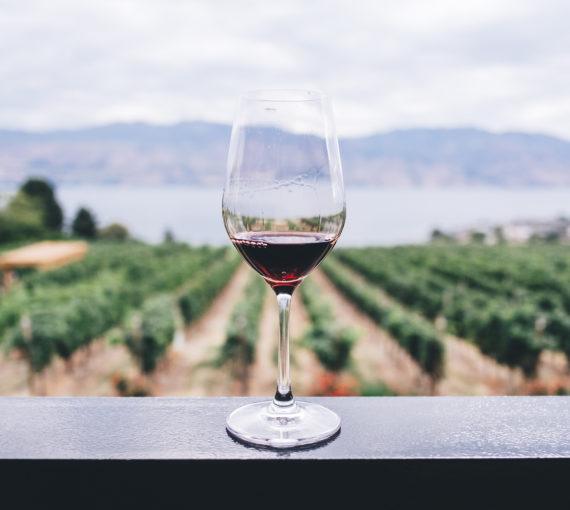
Unsure about which salmon options in your local grocery, seafood store or restaurant are good for you and the ocean?
Fresh and frozen salmon often have “organic,” “farmed responsibly,” “sustainably sourced” or “wild caught” stickers, among others. But what do these labels mean and how can you make the best choices?
Salmon labelling issues
Food labels are meant to provide information so people can compare and choose products more easily. But who controls these labels and who do they benefit?
Most seafood labels favour the salmon farming industry — not shoppers, wild salmon, local stakeholders or Indigenous communities that rely on healthy salmon systems.
According to our partners at SeaChoice, Canadian seafood-labelling guidelines need to be improved because “existing labelling laws in Canada do not require retailers to label their product with necessary information at the point of sale to help consumers make well-informed decisions.” For example, open-net farmed Atlantic salmon can simply be labelled as “salmon.”
All major supermarkets in Canada use at least one of these seafood certifications: Aquaculture Stewardship Council, Best Aquaculture Practices and GlobalG.A.P. In May 2022, more than 40 civil society groups from around the world came together to submit a letter to the ASC farmed standard consultation, calling out the certification scheme for misleading shoppers with its “farmed responsibly” label on open-net pen farmed salmon.
ASC’s “farmed responsibly” label appears on many products in major supermarkets worldwide. But the label doesn’t guarantee an ASC-certified salmon was “farmed responsibly” from hatchery to harvest, only that the salmon product was “likely to have met the ASC standard rules for only some of its production cycle.”
Use SeaChoice’s eco-label info sheet for help navigating label standards.
What salmon to avoid
Regardless of certification, avoid purchasing open-net pen farmed salmon.
Most farmed salmon at your local grocer, seafood store or restaurant is likely from an open-net pen in Canada, Iceland, Norway or Chile.
What’s open-net farmed salmon?
Open-net (or open-net pen) salmon farms are considered to be high-risk aquaculture. They allow contact between the farm and surrounding environment, which permits free exchange of “high concentrations of waste, chemicals, parasites and disease.” Waste products (feces and feed) from farmed salmon go into the surrounding water and settle to the sea floor. This can change the chemical makeup and biological diversity of the seabed and ecosystems surrounding the pens. It also attracts predators and marine mammals that can get tangled in the farm nets and drown.
British Columbia farmed salmon
In December 2021, Seafood Watch red-listed B.C. farmed salmon and urged shoppers to avoid buying B.C. open-net pen farmed salmon because of ineffective lice management and drug resistance, bacterial and viral pathogen concerns and continued use of antibiotics. These issues put juvenile wild salmon at risk and can lead to negative consequences for vulnerable wild salmon populations.
Open-net farmed salmon impacts on wild Chinook salmon
Wild Pacific salmon “connect ecosystems, bringing energy and nutrients from the ocean up streams to spawning grounds. They feed humans, whales, bears and eagles and fertilize magnificent coastal and inland forests.” Parasites, disease and potential escapes from open-net fish farms put all wild Pacific salmon at risk, including Chinook, which are the primary food for endangered southern resident orcas.
Putting an end to open-net farmed salmon in Canada
The good news? In June 2022, the federal minister of fisheries and oceans announced a commitment to phase out Pacific coast open-net pen salmon farms by 2025. SeaChoice is working to support something similar for Canada’s Atlantic coast.
What salmon to choose
Use SeaChoice’s Seafood progress platform to check what initiatives your grocer (click the “Initiative” button on the grocer’s overview page) and seafood brands are taking or not on farmed salmon and sustainable seafood in general.
Ask your restaurant about the salmon they serve. Look for the Ocean Wise symbol on menus and use their salmon guide. Restauranteurs and food retailers want to know what customers want and why.
Farmed salmon from land-based facilities
Land-based closed containment farmed salmon is a responsible alternative that protects wild salmon.
Benefits:
- Treated and recirculating facilities keep free-flowing waste products out of the ocean.
- Water conditions can be closely monitored, preventing mass die-offs common during periods of extreme temperatures at sea.
- Water filtration and segregated fish tanks virtually eliminate disease and parasite outbreaks.
- Compared to sea-based farms, facilities that house farmed salmon from egg to packaged product greatly reduce life cycle travel and fuel consumption.
- Access to grid power means land-based farms use less fossil-fueled energy than net pens at sea.
Land-based salmon facilities in Canada include Kuterra in B.C. and Sustainable Blue in Nova Scotia. Ask your local fishmonger, seafood grocer or restaurant to consider carrying salmon from these suppliers.
Sustainably caught wild Pacific salmon
If you don’t have access to a land-based closed containment farmed salmon, opt for sustainably caught pink salmon from B.C. or the U.S. Use Ocean Wise’s salmon buying guide.
Plant-based salmon alternatives
Mindfully choosing what you put in your body is one of the easiest ways to make a positive difference for the planet. Studies show that a diet rich in plant-based foods improves health and has environmental benefits.
Whether you’re already eating entirely plant-based meals or looking to integrate more into your diet, try this great smoked salmon alternative!

Carrot lox
Ingredients:
- Carrots
- Sea salt
- Hot water
- Nori granules
- Caper brine
- Rice vinegar
- White miso paste
- Soy sauce or tamari
- Lemon juice
- Garlic powder
- Olive oil
For the full recipe, check out The Edgy Veg.



